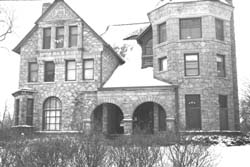

Students, Faculty Consider Issues of Identity
BY
ARIELLA COHEN
Within King’s white walls, Oberlin students discuss, deconstruct and, at times, reconstruct cultural, ethnic, personal, sexual and political
 identities. And as they say in the brochures, Oberlin students don’t leave their intellect in the classroom. With political conversation extending into the public forum, questions of safe space and personal identity have surfaced and intensified on campus.
identities. And as they say in the brochures, Oberlin students don’t leave their intellect in the classroom. With political conversation extending into the public forum, questions of safe space and personal identity have surfaced and intensified on campus.
“When I first came to Oberlin I had a lot of internalized racism. I didn’t identify as Asian American. Coming here, politically active socially conscious students taught me a vocabulary, a way to deconstruct my previous experiences with inequality and racism. At the time I hadn’t known how to voice that. I learned,” junior Kasi Chakravartula said.
That political consciousness, in many ways, defines an Oberlin education. “You could easily go through Oberlin apathetic, thinking none of the politics affected you. The fact is though that you would then really be missing a big part of the Oberlin College experience,” junior Phil Grasso said.
Lately, Grasso, a Zeke resident, as well as an active member of LGBTU, has found himself in the thick of campus politics. With Zeke losing all-male status some wonder about the legitimacy of having a safe space for women.
Baldwin Cottage, the school’s all-female program house defines itself as a “safe space.” Zeke has never publicly claimed that title. “If girls can’t accept the fact that Zeke men need a space, then why should I accept their space. People are justifying discrimination,” junior and Zeke resident Migeul Villafana said.
Grasso, his hallmate, disagreed saying, “I have never felt the need for safe space as a man. There have been times when I did feel weary of being gay, like maybe it was dangerous.”
Goldsmith distinguishes between the right to organize and the right to safe space saying, “I think it’s important for individuals who share interests, experiences and backgrounds to have the opportunity to get together periodically and talk. I could see how men would legitimately feel the need to do this. I wouldn’t call it safe space,” he said, adding that there were other ways to guarantee living in a gender-specific living environment.
A common definition of the term “safe space” denotes it as a physical space designated for a historically disenfranchised people to convene as a supportive, understanding community.
While this particular Oberlin debate is rooted in gender inequality, racial and ethnic questions have also entered campus politics.
“I think there is active political dialogue on campus, but at the same time, I think dialogue regarding communities of color has been faltering. The school is changing its vision of who it wants to be, changing its demographics. Its commitment to people of color is really weakening. I don’t know if it ever was strong. Cutting off need blind admissions, the yearly cuts of funding for student-run organizations and Third World House’s low funding allocation, plus the few tenured professors of color all show this weak commitment,” Chakravartula said.
Although students may question institutional support of various racially and ethnically related needs, the school continues to view itself as an institution well within the parameters of a liberal tradition.
“College years are inevitably years of identitty exploration and formation. That is appropriate and necessary. I also think a liberally educated person needs to acquire the habit of stepping beyond the boundaries of their own social identity and attempt to understand, however imperfectly, the experiences and assumptions of people unlike themselves,” Dean of Students Peter Goldsmith said.
This process of identity formation works to foster an intensity Oberlin thrives on. Political rants and activist pleas wallpaper the campus. Over lunch, students discuss sportsphobia.
“This is our school. We are going to leave, but the political conflict that exists here teaches you about self, politically and personally. Instead of being bitter, appreciate it. Knowing this stuff will be to your advantage,” junior Freedom Nguyen said.
Professors also feel the effects of student passion. “Lenin’s theory of imperialism and Wagner’s music are both deeply rooted in anti-Semitism. I am Jewish, and I lost at least a dozen close family members in the Holocaust. If I let that pain, rooted in my identity, dominate my thinking, though, I would totally reject Lenin’s and Wagner’s invaluable work, which is so important to understand and appreciate. So I try to leave my identity at the door of my study and my classroom. And although I know how difficult and painful it can be to do so, I wish more students could, at least to some degree, do it too,” Professor of politics Mark Blecher said.
This Monday at 8 p.m. a panel of scholars will discuss where the effects of white privilege on education, beginning yet another thread of campus discourse. And, as College President Nancy Dye said, “A good education is never comfortable.”
“Talking about decisions of identity is always important for young adults. Part of that is issues of how Americans have experienced history differently. If these issues were never talked about, learning our culture would be impossible. We need to learn to discuss difficult, sensitive topics in civil, open-minded ways…Through living together within the Oberlin community, we confound stereotypes, one goal of a liberal education.” College President Nancy Dye said.
![]()
College Defends Custodians Despite Arrests
School Considers Art Building Expansion
Students, Faculty Consider Issues of Identity
Voces May Gain Status as Charter
Bent Crayon Records: Indie Rock Shangri-La
Town Building Considered for Student Housing
Health Care, Kettering Among Issues Raised At Trustee Forum
They Might Be Giants Will Fling This Spring
Senate Needs 1,500 Student Votes
Organizations Vie for Funding from Student-Run SFC